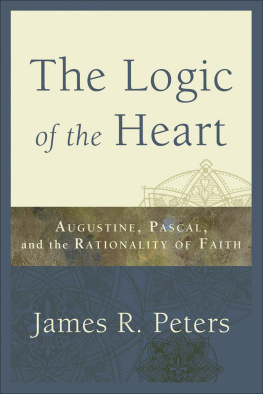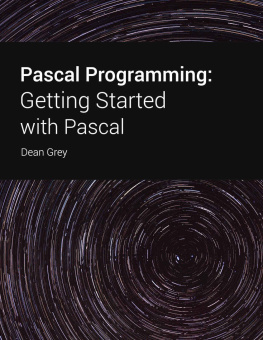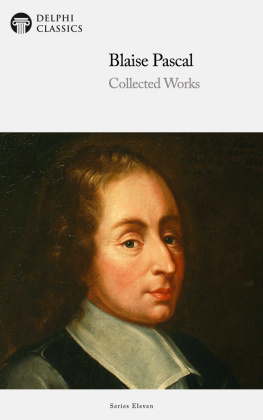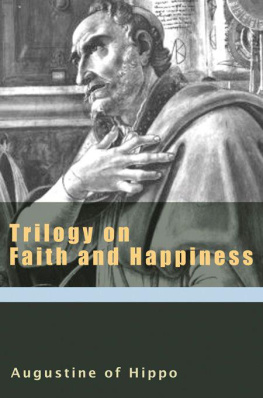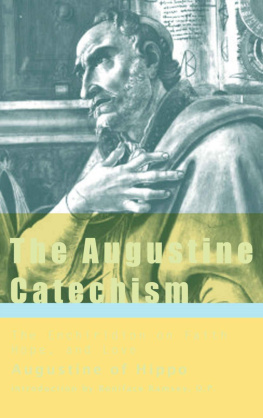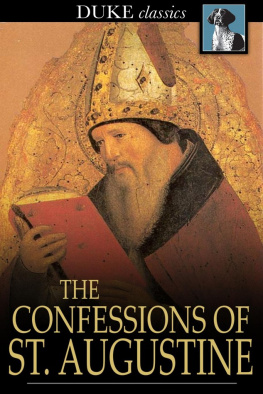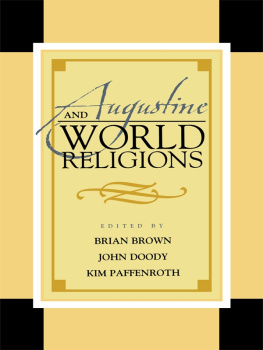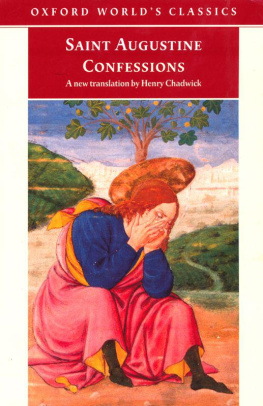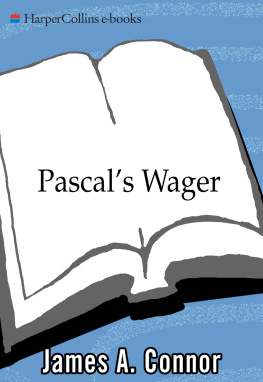James R. Peters - The Logic of the Heart: Augustine, Pascal, and the Rationality of Faith
Here you can read online James R. Peters - The Logic of the Heart: Augustine, Pascal, and the Rationality of Faith full text of the book (entire story) in english for free. Download pdf and epub, get meaning, cover and reviews about this ebook. year: 2009, publisher: Baker Publishing Group, genre: Religion. Description of the work, (preface) as well as reviews are available. Best literature library LitArk.com created for fans of good reading and offers a wide selection of genres:
Romance novel
Science fiction
Adventure
Detective
Science
History
Home and family
Prose
Art
Politics
Computer
Non-fiction
Religion
Business
Children
Humor
Choose a favorite category and find really read worthwhile books. Enjoy immersion in the world of imagination, feel the emotions of the characters or learn something new for yourself, make an fascinating discovery.
- Book:The Logic of the Heart: Augustine, Pascal, and the Rationality of Faith
- Author:
- Publisher:Baker Publishing Group
- Genre:
- Year:2009
- Rating:4 / 5
- Favourites:Add to favourites
- Your mark:
- 80
- 1
- 2
- 3
- 4
- 5
The Logic of the Heart: Augustine, Pascal, and the Rationality of Faith: summary, description and annotation
We offer to read an annotation, description, summary or preface (depends on what the author of the book "The Logic of the Heart: Augustine, Pascal, and the Rationality of Faith" wrote himself). If you haven't found the necessary information about the book — write in the comments, we will try to find it.
James R. Peters: author's other books
Who wrote The Logic of the Heart: Augustine, Pascal, and the Rationality of Faith? Find out the surname, the name of the author of the book and a list of all author's works by series.
The Logic of the Heart: Augustine, Pascal, and the Rationality of Faith — read online for free the complete book (whole text) full work
Below is the text of the book, divided by pages. System saving the place of the last page read, allows you to conveniently read the book "The Logic of the Heart: Augustine, Pascal, and the Rationality of Faith" online for free, without having to search again every time where you left off. Put a bookmark, and you can go to the page where you finished reading at any time.
Font size:
Interval:
Bookmark:

2009 by James R. Peters
Published by Baker Academic
a division of Baker Publishing Group
P.O. Box 6287, Grand Rapids, MI 49516-6287
www.bakeracademic.com
Ebook edition created 2013
All rights reserved. No part of this publication may be reproduced, stored in a retrieval system, or transmitted in any form or by any meansfor example, electronic, photocopy, recordingwithout the prior written permission of the publisher. The only exception is brief quotations in printed reviews.
ISBN 978-1-4412-0571-1
Library of Congress Cataloging-in-Publication Data is on file at the Library of Congress, Washington, DC.
Unless otherwise indicated, Scripture quotations are from the New Revised Standard Version of the Bible, copyright 1989, by the Division of Christian Education of the National Council of the Churches of Christ in the United States of America. Used by permission. All rights reserved.
Scripture quotations labeled KJV are from the King James Version of the Bible.
Scripture quotations labeled NEB are from The New English Bible . Copyright 1961, 1970, 1989 by The Delegates of Oxford University Press and The Syndics of the Cambridge University Press. Reprinted by permission.
September 1, 1939 (which appears on pp. 218, 230, 24142, and 264), copyright 1940 & renewed 1968 by W. H. Auden, from COLLECTED POEMS by W. H. Auden. Used by permission of Random House, Inc.
[Text not included because of rights restrictions.]
C ONTENTS
A CKNOWLEDGMENTS
My work on this book began at a National Endowment for the Humanities seminar on the philosophy of David Hume, held at Dartmouth College in Hanover, New Hampshire, in the summer of 1990. I am grateful to both the faculty and participants of that seminar for six weeks of a most engaging and lively exchange of ideas and arguments. Two professors there, Donald Livingston and Terence Penelhum, deserve special mention. From Donald Livingstonunder whom as both an undergraduate and graduate student at Northern Illinois University I had the privilege of studying Humes philosophyI continued to learn to read Hume as a subtle and complex historical thinker whose skeptical vision is inextricably bound up with a humanistic Ciceronian concern for civil politics, humane social order, and the concord of the life of the passions. In Terence Penelhum I found a living and exemplary model of how a Christian philosopher ought to engage a great adversary like the dreaded Scot, David Humewith unfailing seriousness tempered by humble charity and deep respect. Professor Penelhums God and Skepticism is a towering classic from which I have greatly benefited.
My aim in The Logic of the Heart is to provide a clear and nontechnical philosophical defense of the rationality of Christian faith. I hope that my book will meet the interests of a wide range of readers, from academic philosophers and theologians to ordinary laypeople confronted with the challenges of postmodern accounts of religious pluralism and metaphysical skepticism. The Logic of the Heart is deeply indebted to the critiques of Enlightenment rationality found in such works as Alasdair MacIntyres Whose Justice? Which Rationality? (1988) and Three Rival Versions of Moral Enquiry: Encyclopaedia, Genealogy, and Tradition (1990); Stanley Hauerwass A Community of Character: Toward a Constructive Christian Social Ethic (1981) and A Better Hope: Resources for a Church Confronting Capitalism, Democracy, and Postmodernity (2000); Alvin Plantingas Warranted Christian Belief (2000); and the critiques of postmodernism in these works, as well as in David Bentley Harts The Beauty of the Infinite: The Aesthetics of Christian Truth (2003). The uniqueness of The Logic of the Heart lies in its focus on Pascals and Augustines non-Enlightenment vision of human rationality, and in the comparative analysis of Pascal and Hume that elucidates the fundamental differences in their perspectives on theism and defends Pascals account of reason and faith. Calling on this Augustinian and Pascalian account of the embeddedness of human rationality, The Logic of the Heart contends that human reasoning on ultimate issues of human life is inextricably bound up with those affections and feelings that reveal to us our proper place in creation. Reason can function properly only when reason is informed by the intuitions of the heart, as nurtured by historically constituted traditions of belief and practice.
In defending the inseparability of reason and affection, The Logic of the Heart bears some resemblance to two fine works of twentieth-century philosophy, C. S. Lewiss The Abolition of Man (1944) and William Wainwrights Reason and the Heart: A Prolegomenon to a Critique of Passional Reason (1995). Neither of these classic works, however, specifically defends the reasonableness of Christian faith for the postmodern world in the contexts of reason, affection, and embeddedness, loci shared among Augustine, Pascal, and Hume, on the one hand, and the postmoderns, on the other, but the sharing of which leads to widely divergent conclusions. The Logic of the Heart defends Augustinian and Pascalian embedded reason as a viable middle ground between the Enlightenments affirmation of universal rational autonomy and radical postmodernisms affirmation of the poetics of self-creation.
A recurring theme in The Logic of the Heart is the importance of the Socratic tradition in understanding all three of the major philosophers whose arguments about faith and reason differently make up the substance of my work. For my appreciation and understanding of the Socratic vision of the philosophical quest I am especially indebted to three of the finest teachers I have ever knownMichael Gelven at Northern Illinois University and Kenneth Seeskin and the late Reginald Allen at Northwestern University. My debt to these three men is incalculable; in both word and deed, they have shown me what it means to love wisdom. Despite their noble efforts, I acknowledge that my own rendition of the Socratic vision of life comes up short, both in its eloquence and substance. I hereby exonerate them from any responsibility for my inadequate and halting efforts to convey in words the passion of spirit and clarity of insight they so generously shared with me.
I also wish to give special thanks to my colleagues at the University of the SouthWilliam Garland, James Peterman, Christopher Conn, and Andrew Moserwith whom I have enjoyed hours and years of philosophical conversation and from whom I have learned so much about deep and important philosophical matters. I would like also to thank my students at the University of the South, not only for their fruitful insights and questions that have deeply shaped my own thinking, but also for their patience in permitting me to continue to be a mere apprentice for twenty-three years in that honorable craft known as the teaching of philosophy. I owe an especially warm thanks to three of my most thoughtful Christian friendsJon Bruss, Wilmer Mills, and Dale Richardsonwho graciously read and commented on my manuscript at various stages of its completion. Luther Leibensberger, cherished elder brother in the faith, has long provided yet another source of thoughtful insight on the life of faith. I would like to express as well my sincerest gratitude to David Haskell for his generous and perceptive comments on my text. David has taught me by word and example what it means to think with the heart. To these patient friends and cherished fellow pilgrims I owe a debt I cannot repay.
I am also deeply grateful to Bill Davis and Reg McLelland and their students at Covenant College in Lookout Mountain, Georgia, all of whom offered invaluable comments on earlier drafts of my chapters on Humes case against miracles and Augustines conception of charitable reason. During the last fifteen years, I have further benefited from the helpful comments on earlier versions of my text graciously provided by many friends and colleagues. I would like especially to thank Stanley Hauerwas, Tad Lehe, Scott Sinclair, the late Monroe Spears, and the late Cecil Woods. Tom Kennedy, outstanding former editor of the Cresset , offered invaluable counsel on an earlier draft of my chapter on Augustine. I am deeply grateful to Tom for his gracious editorial assistance and years of friendship. At a crucial stage in my life when I was a zealously skeptical college student, Dick Thompson convinced me through his generous and thoughtful spirit to rethink my blind faith in the wisdom of Bertrand Russell. Though I did not know it at the time, Dick Thompson provided me with a living witness to the logic of the heart. For his enthusiastic support, I would also like to thank my friend Creston Davis, now assistant professor of religion at Rollins College, who read my manuscript and introduced me to Robert Hosack, an editor of the highest caliber, at Baker Academic. I cannot thank Bob Hosack warmly enough for his willingness to work with me to bring this bookso long in the growingto fruition. I would also like to express my gratitude and appreciation to the reviewer for Baker Academic whose penetrating advice led me to make crucial changes in my text. I am grateful as well to Brian Bolger and his editorial team at Baker Academic, whose keen eye for details has saved me much shame. For technical and practical assistance in the wearisome production of scores of drafts, I thank Tammy Elliot, who threw in graciousness, patience, and a warm smileno extra charge.
Next pageFont size:
Interval:
Bookmark:
Similar books «The Logic of the Heart: Augustine, Pascal, and the Rationality of Faith»
Look at similar books to The Logic of the Heart: Augustine, Pascal, and the Rationality of Faith. We have selected literature similar in name and meaning in the hope of providing readers with more options to find new, interesting, not yet read works.
Discussion, reviews of the book The Logic of the Heart: Augustine, Pascal, and the Rationality of Faith and just readers' own opinions. Leave your comments, write what you think about the work, its meaning or the main characters. Specify what exactly you liked and what you didn't like, and why you think so.

